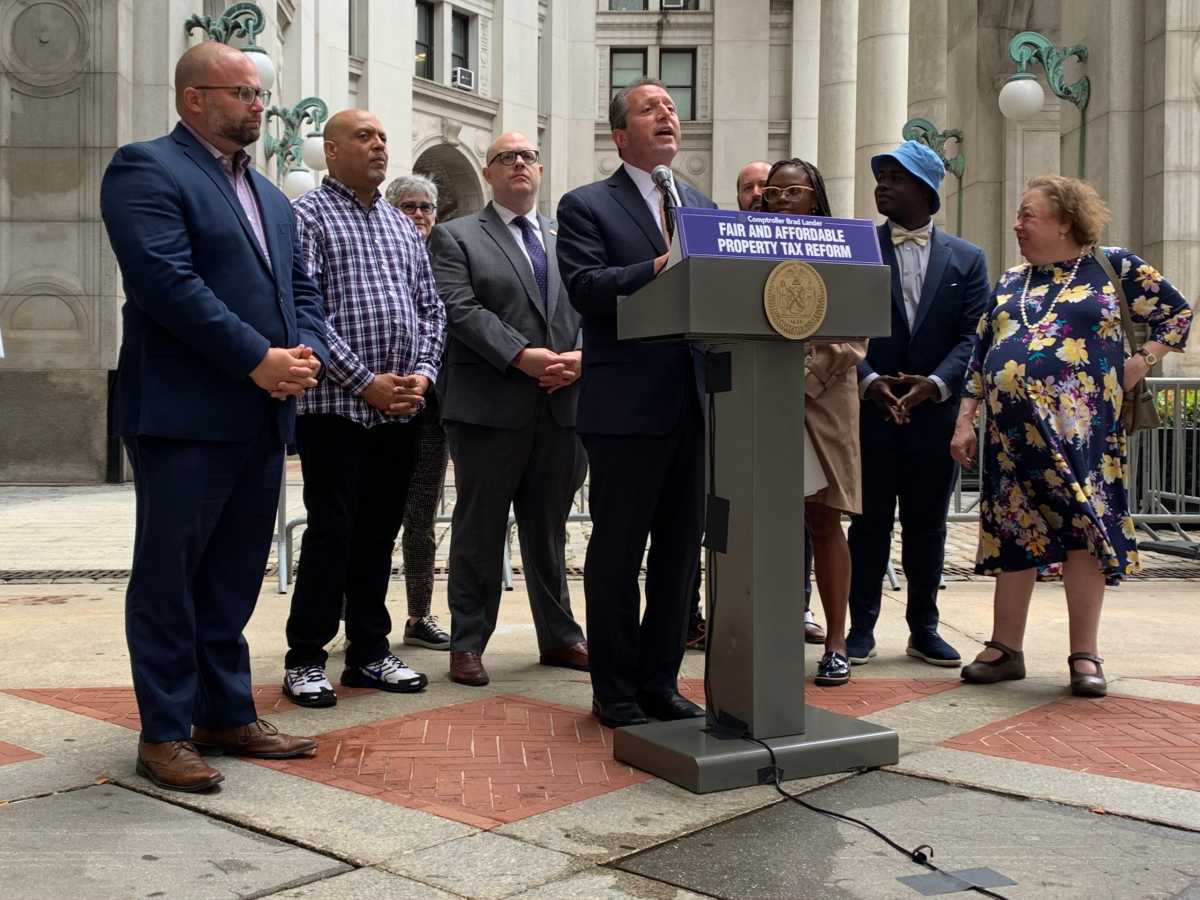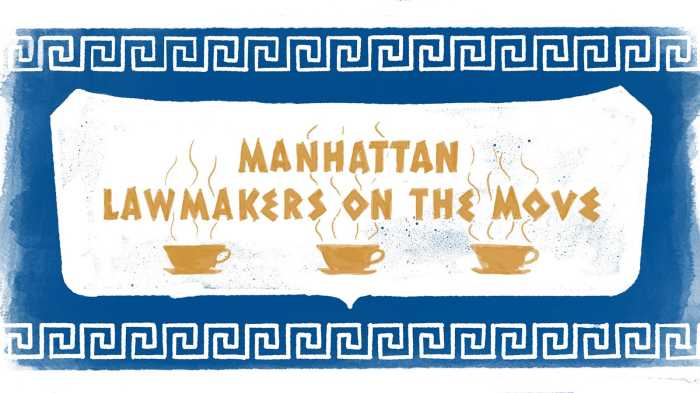A day after the 421-a tax break used to incentivize developers to build affordable housing died on June 15, a bipartisan group of lawmakers danced on its grave Thursday, while calling for comprehensive reforms to the city’s property tax system.
City Comptroller Brad Lander, who’s been leading the charge at the city level to let the housing tax break expire this year without a replacement, gathered with both Democratic and Republican city and state electeds outside the David N. Dinkins Manhattan Municipal Building Thursday to celebrate the end of 421-a and lay out a vision for property tax reform.
“The expiration of 421-a yesterday – our city’s biggest tax boondoggle, a $1.77 billion giveaway to for-profit private developers, mostly market rate housing, built on top of an opaque broken inequitable property tax system – its expiration yesterday gives us a once in a generation opportunity to fix what is broken in New York City’s property tax system,” Lander said.
“I want to praise the state legislature here. Because what the Senate and the Assembly did in saying ‘no more’ to 421-a is not only smart because that is a $1.77 billion giveaway that doesn’t achieve our affordable housing goals, it also is like a giant rickety fix built on top of a broken property tax system. And letting it expire lets us look at it in the new light of day and say, ‘what can we do together to fix what is broken in the underlying property tax system to make it fair and equitable?’” he added.
The comptroller was joined by the state Senate Finance Committee Chair Liz Kruger (D – Manhattan), Senate Housing Committee Chair Brian Kavanagh (D – Manhattan), Assembly Member Harvey Epstein (D – Manhattan), City Council Members Nantasha Williams (D – Queens), Kevin Riley (D – Bronx) and Justin Brannon (D – Brooklyn). Plus two Staten Island Republican Council Members Joe Boreli – the body’s minority leader – and David Carr.
According to the comptroller, reforming the property tax system by lowering taxes on rental development, which he said is currently taxed at twice the rate of new condominium development, is key to building more multi-family unit housing in the city. At the same time, giving the city Department of Housing Preservation and Development (HPD) the ability to underwrite tax breaks tailored to specific developments based on their costs and the level of affordability they’re targeting will allow for the creation of more affordable housing.
“What we’re saying is, for affordable housing, you go to HPD and they will be able to underwrite a deal specific tax break that reflects what your actual costs are of your land, what your actual affordability that you’re granting is,” Lander said. “Not an as of right giveaway, but a targeted affordable housing program.”
Lander and many others have consistently rooted for the demise of the 421-a, arguing the tax break has been a lucrative giveaway to developers that doesn’t lead to the construction of much truly affordable housing.
On the other side, the real estate industry has long argued that 421-a – or an equivalent tax break – is needed to build more affordable housing. The Real Estate Board of New York (REBNY) supported Governor Kathy Hochul’s proposed 421-a replacement, 485-w. Neither 421-a nor its replacement were able to garner enough support during the state legislative session to be passed into law.
Lander’s news conference came just two days after Mayor Eric Adams unvieled his plan to address the city’s housing and homelessness crises. Adams, however, didn’t include specific targets for how much new affordable and supportive housing he wants to build and how many people he’d like to see housed.
Besides impeding the construction of affordable housing, Lander and the group of lawmakers decried the city’s property tax system for taxing middle income communities in Staten Island, the northeast Bronx and southeast Queens at a much higher rate than wealthier parts of Manhattan and Brooklyn.
“What unites homeowners in southeast Queens and the northeast Bronx and Staten Island? They pay three times the effective tax rate that I pay on my home in Park Slope, that is profoundly inequitable,” Lander said. “And we’ve got other folks here from communities who have a relatively low tax rate saying ‘we must have a fair system.’ And we’re willing to fight for it together side-by-side with those people who are treated unfairly by it.”
Williams, who represents part of southeast Queens, said the current system is hurting homeowners in her community and Lander’s proposed reforms are a step towards evening the playing field.
“Homeowners in neighborhoods where their home values have risen, underpay relative to the value of their assets,” the council member said. “While the other homeowners overpay to make up the difference. Our property tax system is simply unfair and it must be made simple and transparent.”
There are three major components to achieving property tax reform in the city, Lander said. First, is implementing recommendations from the NYC Advisory Commission on Property Tax Reform released late last year that call for removing what are known as assessed value growth caps, which are seen as the primary driver of tax inequity – according to a release, and replacing them with market value changes over five years.
They also suggested implementing a tax deferral program to help low and moderate income homeowners stay in their homes.
Second, Lander said, is supporting the creation of new multi-family rental units by making taxes on the construction of new rentals equal with that of new condos. And third, is to promote the construction of more affordable housing by having HPD underwrite specific developments based on the affordability of the units they’re planning to build.
Lander and the council, however, don’t have the ability to directly change the tax system itself as those decisions are made at the state level. But Kruger and Kavanagh both said they’re going to push for property tax reform during the next legislative session that starts in January.
“This is a win-win, it will require the city and the state to work in coordination,” Kruger said. “I’m here with some of my colleagues from Albany and I know that we’re all committed to helping the city elected officials come up with the best plan for the city of New York and move it through Albany.”







